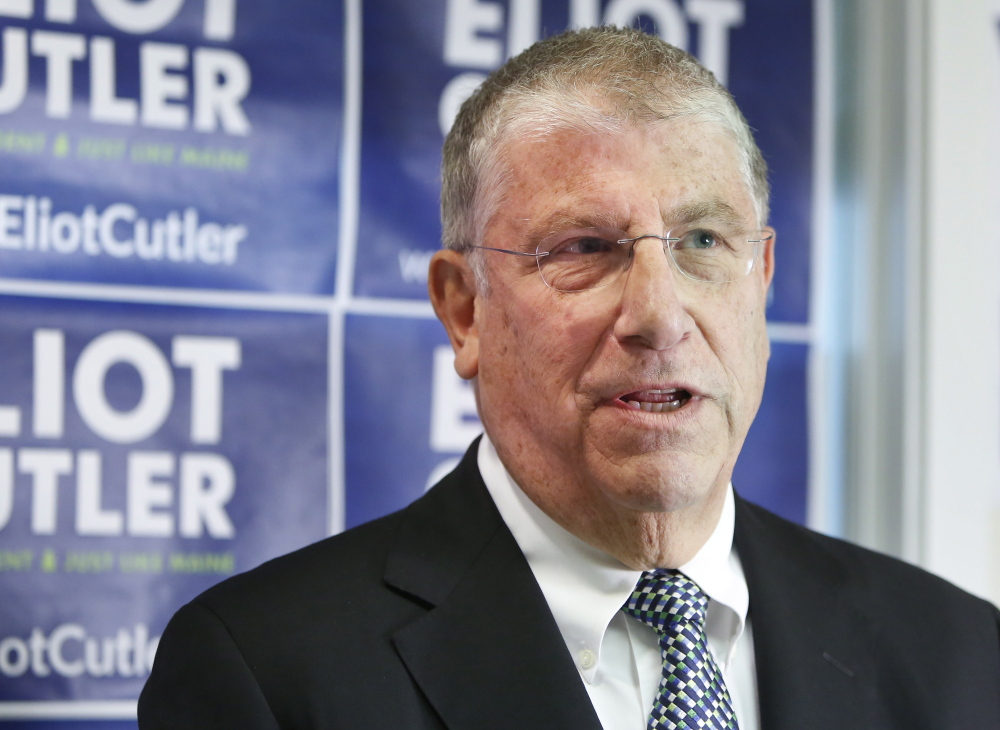Eliot Cutler does not think he’s the best candidate for governor: He thinks he’s the only candidate. Consider this statement he made in May:
“I don’t believe either Mike Michaud or Paul LePage has the skills, temperament or independence to lead Maine and rebuild our economy. I am running to make sure neither is elected and that I am, and I feel confident that on Election Day I will be poised to be Maine’s next governor.”
At the time, that was seen as the windup to a message to his supporters that he would “release” them on Election Day rather than be a spoiler if he thought he couldn’t win, but it should be clear by now that he said what he meant to say.
Cutler is not spending a million dollars of his own money to help someone else get elected, and if any of his supporters are having a hard time deciding who they should vote for, don’t expect the candidate to make it easy. Cutler may say he likes ranked-choice voting, but in this race he has no second choice. It will be up to his supporters to decide if they feel the same way.
Wednesday night is the moment that Cutler campaigned for all summer: a debate among all three candidates for governor on WCSH-TV (Channel 6). It’s the first one on television and the one that will likely have the biggest audience. Cutler had hoped this would be a game changer for him – and it still could affect the race, but probably not enough to make him governor.
Here’s what the polls tell us: LePage and Michaud are locked in a statistical tie, and Cutler is running a distant third.
Here’s the other thing they show: Michaud is stuck somewhere around 40 percent. Cutler is stuck somewhere in the teens. LePage has been gaining strength slightly. Unless there is some movement of voters between Cutler and Michaud, Gov. LePage has a very good chance of winning a second term in the Blaine House.
So over the next 20 days, the challenge for Cutler voters will be to decide if the candidate that they think has the right ideas for Maine is correct on one very important point of political analysis – his assessment that both of the alternatives would be equally bad. Wednesday night, those supporters should take a moment to look away from their first choice and decide if it really doesn’t matter which of the other two wins.
Cutler complains that the media doesn’t pay enough attention to issues and that we are focused on the “horse race,” but in this campaign, the horse race is the issue. Or, put another way, there is only one issue in this campaign, and his name is Paul LePage.
I’m not talking about his personality, or his propensity to say things that make people cringe. What’s up for a vote is the relentless anti-government ideology that has guided his decision-making for 3½ years. It’s a philosophy that says government can’t play a positive role in people’s lives, and he works to undermine the government and prove his point.
Faced with crumbling infrastructure, he refuses to issue bonds. Faced with a growing number of children who don’t have enough to eat, he makes food stamps harder to get.
Budget shortfalls lead to tax cuts, environmental regulation is run by industry lobbyists, and a minimum-wage hike, solar power incentives and family planning services for low-income women are all occasions for vetoes.
As much as Cutler would like to make this an election about himself and his ideas, it’s really a referendum on Paul LePage, and the question for voters is “Four more years – yes or no?” And like it or not, Michaud is the “no.”
Michaud has worked characteristically hard to position himself as LePage’s opposite. He is careful. He is polite. He doesn’t lose his temper, and unlike the governor, he rarely surprises people by saying something interesting.
Michaud is LePage’s opposite on policy, too, but Michaud’s policies are less important in this election than the ones Le-Page is defending this fall.
Cutler supporters can follow their candidate and claim to be indifferent between the other contestants.
That’s not a position that asylum seekers would embrace. LePage has gone to court to take away their rent subsidies while they are legally barred from working. It’s also not a position an uninsured worker scraping by on the edge of poverty could afford to take: LePage has vetoed federally funded health care for them five times.
Three weeks out from Election Day, voters can say that they don’t like the choice between the two leading candidates, but they can’t say that there is no choice, because there is.
It’s just not the one Cutler would have wanted.
Send questions/comments to the editors.



